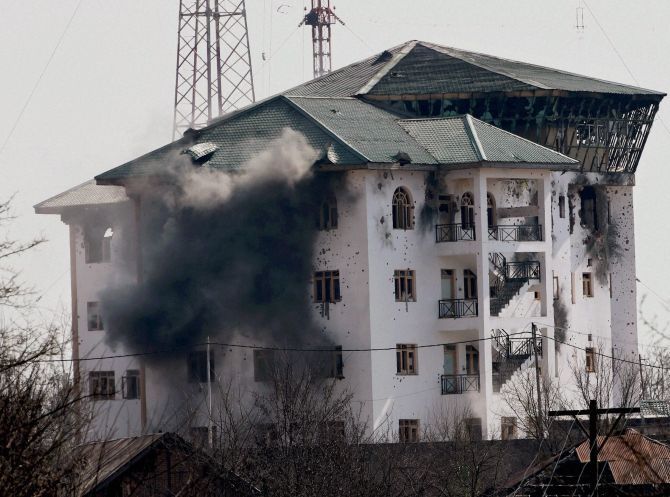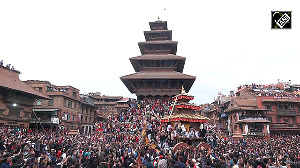'Just this week, the Indians killed a Kashmiri terrorist, who is a member of Hizbul Mujahideen.'
'This is a nasty terrorist organisation, and did Pakistan welcome this killing?'
No, in fact, they denounced it and referred to him as a Kashmiri separatist.'
'These Kashmiri terrorist groups have been aided by the Pakistani State.'
Rediff.com's Aziz Haniffa reports from Washington, DC.

Among the 100 EDI staff rescued by security forces was an IT manager named Syed Mueen, whose father Syed Salahuddin is the leader of the Hizbul Mujahideen.
Photograph: S Irfan/PTI
Asserting that the United States should have no qualms on cutting all assistance to Pakistan, strategic expert Bill Roggio has told a US Congressional hearing that designating Islamabad as a State sponsor of terrorism is long overdue.
Roggio, senior editor of the Long War Journal, was a witness at the Congressional hearing exploring if Pakistan was a friend of foe in the fight against terrorism. He went on to describe Pakistan's support and sponsorship of several terrorists groups active in Kashmir in addition to anti-American, anti-Afghanistan terror outfits.
'They support numerous terrorist organisations, organisations that are listed by the US government as Foreign Terrorist Organisations,' Roggio said.
His Foundation for Defence of Democracies (which publishes the Long War Journal) could list several 'dozens or scores of groups that Pakistan supports in India, in Afghanistan -- groups that are designated terrorist organisations that provide aid and support to Al Qaeda -- groups that have leaders who serve as the deep bench for Al Qaeda and other terrorist groups, when their leadership is winnowed down by drone strikes.'
Arguing that 'the evidence is indisputable' Roggio pointed out, 'Just this week, the Indians killed a Kashmiri terrorist, who is a member of Hizbul Mujahideen. This is a nasty terrorist organisation, and did Pakistan welcome this killing? No, in fact, they denounced it and referred to him as a Kashmiri separatist.'
'This is an individual who recruits online for holy war and is recruiting youth and poisoning the youth to conduct terrorist attacks and lest we pretend that this is a Pakistani issue with Pakistan and Kashmir, it is not,' Roggio said.
'These Kashmiri terrorist groups that have been aided by the Pakistani State, base themselves in Afghanistan and I could list Lashkar-e-Tayiba, Harkat-ul-Mujahideen, whom the State Department said, as recently as 2014, is running training camps in Afghanistan.'
'These groups are attacking and killing US soldiers,' Roggio said, 'and I have not even touched on groups like the Taliban, the Haqqani Network or the Mullah Nazir groups.'
'What the Pakistanis are doing is that they are playing a fantastic shell game, he told the lawmakers. 'They have this narrative called the good Taliban and bad Taliban. The good Taliban is any group that the Pakistanis like and those are groups that don't attack the Pakistani State, but carry out Pakistani policy, like the Afghan Taliban, the Haqqani Network.'
The LeT, JeM and the Harkat-ul-Mujahideen, Roggio said, 'are considered good Taliban as well. The bad Taliban are the ones that fight the Pakistani State.'
His organisation's website 'that lists this narrative has been banned in Pakistan and we are banned because Pakistan has a history of killing individuals that expose these types of situations,' he said, and cited the example of investigative journalist Syed Saleem Shahzad, 'who was brutally executed by the ISI for his reporting on the links between Pakistan's intelligence service and Al Qaeda occurring within Pakistan.'
'Pakistan is not going to change its calculus,' Roggio told the lawmakers. 'These groups they support, they are doing this because they believe it is their best chance encountering India and that's why they support them.'
'I also believe there is an ideological aspect within large elements within the military and intelligence services -- you have this confluence of it helps its policy on India as well as they get the ideological support as well.'
'These groups,' Roggio argued, 'also provide Pakistan strategic depth for Pakistan against India and it uses these groups inside of Afghanistan to also target US forces and kill US forces.'
'All funding to Pakistan should stop,' he asserted, 'until we can get a brake on this situation. We have to consider sanctions, we have to consider the State sponsorship of terrorism.'
Roggio also called for 'cutting off trade, cut off visas, student visas, unless Pakistan changes its habits.'
'We have been enabling the Pakistani State for 15 years now and nothing has changed and it's only gotten worse.'
Another expert witness, Dr Tricia Bacon, a former State Department official who served in its Bureau of Intelligence and Research, the Bureau of Counter-Terrorism and the Bureau of Diplomatic Security, briefed lawmakers that for all of Pakistan's assurances to cease its dual-track policy, 'The calculus of the Pakistani army, the primary institution that wields power over these policies remains unwavering.'
'It is evident that no terrorist attack in Pakistan is large enough to cause them to re-evaluate their position vis-a-vis their militant proxies,' Dr Bacon said.
'Instead, relations with the four major proxy groups, LeT, JeM, the Haqqani Network and the Afghan Taliban remain a deeply entrenched component of Pakistan's national security policies,' she added.
'First and foremost, as is well known, Pakistan's security establishment judges groups based on their utility vis-a-vis India," Dr Bacon, now a professor at American University, said. 'This is not simply about Kashmir. This is also about deep-seated fears that India is inherently aggressive toward Pakistan.'
'This stems from Pakistani support for the Afghan Taliban and Haqqani Network,' she explained. 'which stem from fears of Indian encirclement and a desire to prevent India from expanding its influence on Pakistan's western border.'
'As the military's efforts to achieve conventional parity grow increasingly futile and the security situation in Afghanistan continues to deteriorate,' Dr Bacon noted, 'Pakistan will remain committed to these policies.'
When US Congressman William Keating, the ranking member of the subcommittee on terrorism, non-proliferation and trade, which convened the hearing jointly with the Subcommittee on Asia and the Pacific, recalled that the late Pakistan prime minister Zulfikar Ali Bhutto had called the ISI 'a State within a State' asked the panelists if the ISI was a 'rogue element not answerable to Prime Minister (Nawaz Sharif),' and how far its reach was within the Pakistan State, Dr Bacon said, 'It is by no means a rogue institution within Pakistan.'
'It is not operating independently or on its own. It is an instrument or an arm of the Pakistani army. It is implementing the policies of the Pakistani army. So, it's not a few officers and it is not making policy up. It is implementing on behalf of the Pakistani army,' she said.
The ISI, Roggio added, 'is an arm of the Pakistani military. It is executing the will of the Pakistani military, which is indeed the Pakistani State.'
'The (elected and civilian) government,' he said, 'is just the face of the Pakistani military.'











 © 2025
© 2025